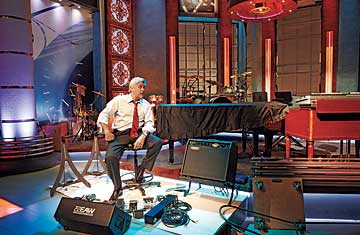
One challenge Leno, on his new set, faces is pleasing old fans without seeming to copy The Tonight Show.
JAY LENO DROVE TO WORK TODAY IN AN 84-YEAR-OLD CAR.
It sits in his parking space in the NBC lot, on this sweltering summer morning in Burbank, a 1925 Model T Roadster. "That's part of my social experiment, being green," he tells me. "It's my theory that if you drive the same car for 80 years, you're more environmentally friendly than buying a new car every five or six years, even if it's a hybrid. I mean, that is the original green car. It has nothing on it. There's no water pump, no oil pump. There's no--it just has what you need to get from point A to point B."
Leno has newer, fancier cars and motorcycles, more than 100 of them; he drives a different one nearly every day to his job, which presently involves figuring out how to make sleepy people laugh and keep a legendary TV network from imploding. But his eco--Tin Lizzie is a particularly good metaphor for Leno's new show. It's a simple antique being repurposed to solve a 21st century problem of limited resources.
No offense to the former Tonight Show host--who at 59 is a quarter-century younger than his wheels--but NBC's The Jay Leno Show, which debuts Sept. 14 at 10 p.m., is the oldest thing in TV: a comedy-variety show, with a funnyman, a stage, guests and in-show ads. And yet it is also a radical experiment: a single show airing every weeknight during prime time on a major broadcast network, cheaper to produce for an entire week than a single hour of the pricey scripted dramas that usually hold such a time slot.
NBC says it's facing media reality, that big audiences are getting harder to find. That the network business model is drying up as viewers turn to cable, skip ads by recording shows on DVRs or watch online. That the major networks, which once gathered tens of millions of viewers and promulgated a homogeneous national culture, are now, essentially, just big cable channels. And that they--like the automakers whose commercials once lavishly floated them--must learn to get smaller or else end up like American Buggy Whip Inc.
If The Jay Leno Show succeeds--where succeeding means not getting more viewers than the competition but simply increasing NBC's profit margin--it suggests a TV future in which ambitious dramas become the stuff of boutique cable, while the broadcasters become a megaphone for live events and cheap nonfiction. "If the Leno Show works," says former NBC president Fred Silverman, "it will be the most significant thing to happen in broadcast television in the last decade."
It's a business model that says, essentially, the mainstream has shrunk, if it exists at all. Yet the guy NBC has enlisted to usher it into this specialized world is TV's most middle-of-the-road entertainer: a "big-tent guy," he calls himself, who lives and breathes the old-fashioned something-for-everybody philosophy of broadcasting, whose icons include Jack Benny and Ed Sullivan. NBC is trying to adapt to a media future in which audiences choose from a thousand flavors by signing up with America's most successful purveyor of vanilla.
Is this the future of TV? And is Jay Leno the man to drive us back to that future? If so, let's hope he also has a DeLorean.
Not Tonight
